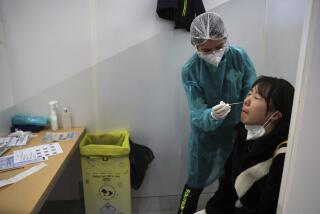Impasse on Handling Iran
- Share via
VIENNA — The European Union and Russia disagreed Thursday over whether Iran should be referred to the United Nations Security Council for failing to report fully on its nuclear program.
The impasse came at a meeting of the board of governors of the International Atomic Energy Agency, the U.N. watchdog.
Russia wants negotiations with Iran to continue, whereas the EU and the United States want to refer the case immediately to the Security Council, which can take various steps, including economic sanctions, to put pressure on the government in Tehran.
This is the latest chapter in a 2 1/2 -year debate over how the international community should deal with Iran’s clandestine efforts to develop nuclear capability. Iran says it wants nuclear technology for peaceful purposes, to generate electricity, but the U.S. and the European Union believe Iran intends to build an atomic weapon.
The EU has tried two approaches in Vienna, circulating two draft resolutions -- one that refers Iran to the Security Council immediately without explicitly finding it in violation of the 1970 Nuclear Nonproliferation Treaty, and an alternative that would find Iran in violation of the accord, but leave open the timing of a referral to the Security Council.
Neither version has been formally submitted to the board.
Late Thursday, Russian officials threw cold water on both proposals, indicating that they wouldn’t support either at the governors board meeting, a diplomat with ties to the IAEA said.
The Russian Foreign Ministry said any effort to take Iran to the Security Council would be “counterproductive and not conducive to the search for a solution to the Iranian problem.”
If Russia votes against referral in Vienna, it probably will not change its mind in New York and allow a resolution critical of Iran to be approved by the Security Council, where it has veto power.
Without the backing of the Russians, referral by the IAEA would be largely meaningless, diplomats said.
China also indicated that it was uncomfortable with the atomic agency referring Iran to the Security Council, but used less categorical language than the Russians, according to diplomats who were present during discussions.
“I don’t think that the Iran issue should come to the Security Council. If it is pushed in that direction, it would cause problems and more divisions,” Wang Guangya, the Chinese ambassador to the U.N., said in New York.
Nonetheless, Western diplomats indicated that the EU was prepared to push the IAEA to decide the issue by majority vote, a departure for the board, which has generally sought consensus on such issues.
There is little doubt that if forced to vote on referral, a majority of IAEA board members would approve it, but Western diplomats have said they want a broad majority -- preferably one that includes Russia and China.
Iran had suspended its nuclear program in November while negotiating with Britain, France and Germany for economic and technological concessions. Its decision last month to resume one of those nuclear activities, the conversion of uranium yellowcake into a gaseous form, precipitated the current face-off. The process is an early step in concentrating fissile material.
In its statement to the IAEA board Thursday, Iran said “certain countries” had “fabricated ... false allegations” against it, and invited the agency’s director general, Mohamed ElBaradei, to visit Iran.
After the meeting, Iran’s ambassador to the IAEA, Mohammed Mehdi Akhondzadeh, made it clear that Iran was betting that the majority of the board members would prefer to act by consensus rather than a simple majority, because unanimity gives the board’s position more clout at the Security Council.
“The main question is whether to refer Iran to the Security Council. There is no consensus whatsoever to that effect,” Akhondzadeh said. “The message is that if there is to be a solution it should be through consensus.”
*
Times staff writers Maggie Farley at the United Nations and Kim Murphy in Moscow contributed to this report.
More to Read
Sign up for Essential California
The most important California stories and recommendations in your inbox every morning.
You may occasionally receive promotional content from the Los Angeles Times.













